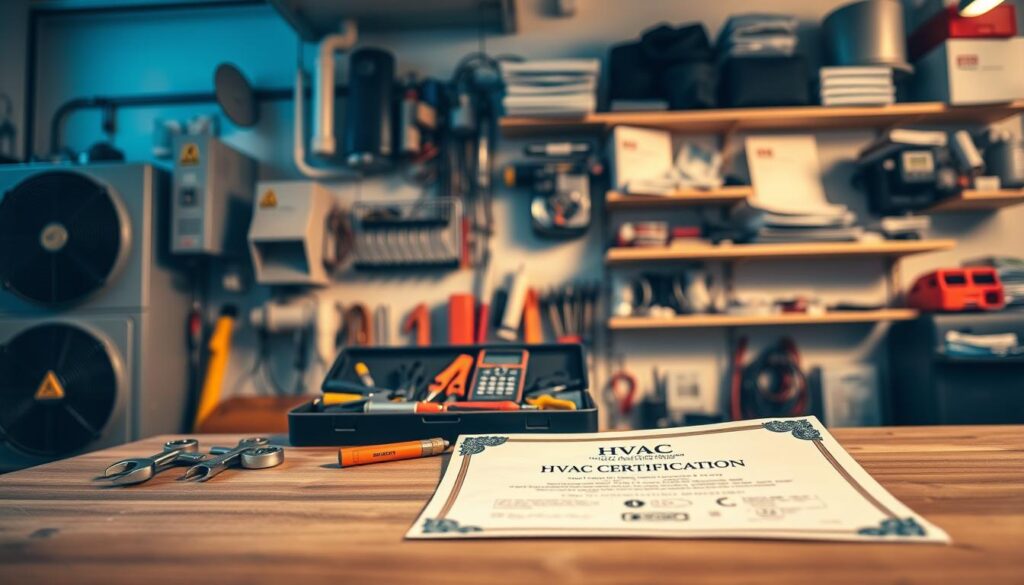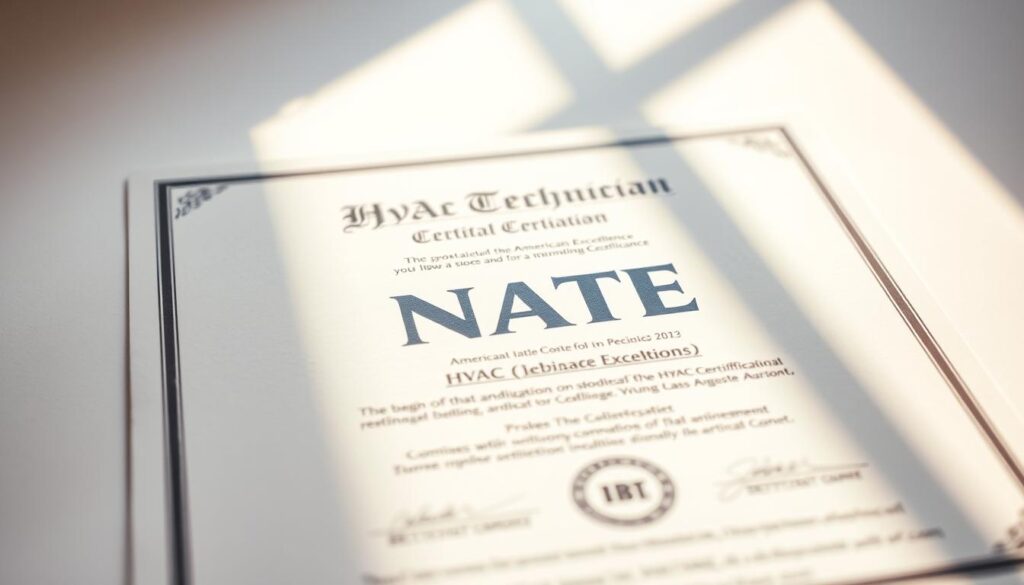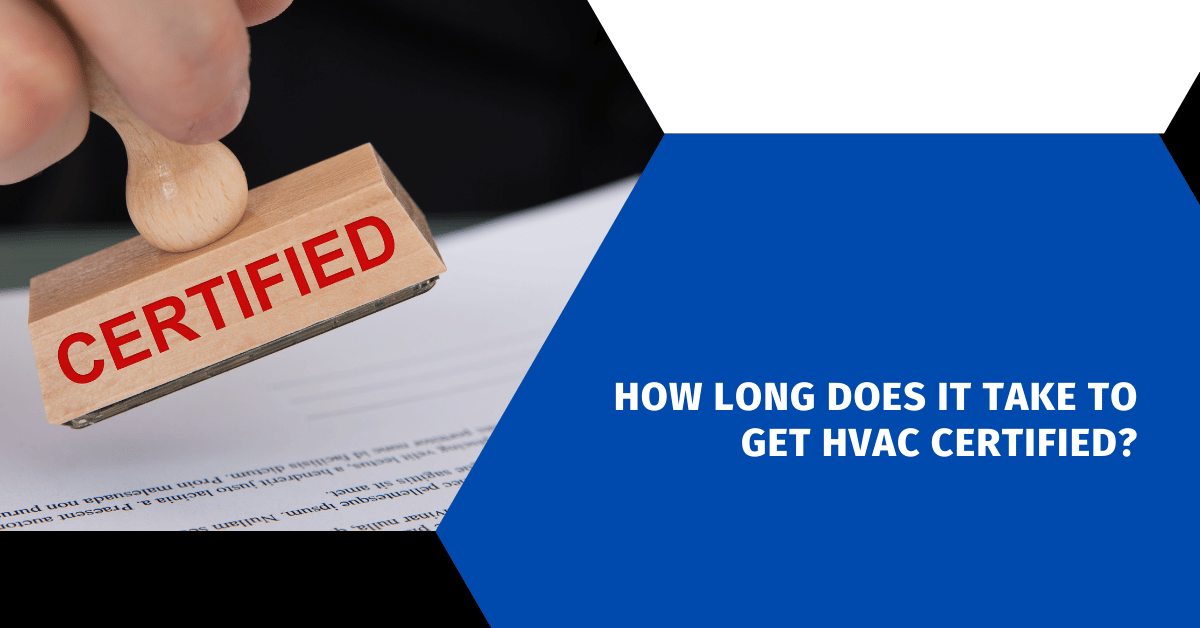Affiliate Disclosure
HVAC Guide Guys is a participant in the Amazon Services LLC Associates Program, an affiliate advertising program designed to provide a means for sites to earn advertising fees by advertising and linking to Amazon.
How Long Does It Take to Get HVAC Certified? Are you curious about starting a career in the HVAC industry? Becoming a certified HVAC technician can happen faster than you might think. Knowing how long it takes to get certified helps plan your career path.

Getting certified in HVAC isn’t the same for everyone. The time it takes can be anywhere from 6 months to 5 years. This depends on your training choice, how fast you learn, and your career goals.
There are different ways to get certified. Certificate programs are the quickest, taking 6-12 months. Apprenticeships offer deep training but take 3-5 years. Your choice depends on your career dreams and what you can afford.
Key Takeaways
- HVAC certification duration varies from 6 months to 5 years
- Certificate programs offer the fastest path to certification
- Apprenticeships provide extensive hands-on training
- Multiple educational pathways exist for HVAC certification
- Certification boosts job chances and income
Table of Contents
Understanding HVAC Certification and Its Importance
Getting into HVAC certification can seem tough, but it’s key for a good HVAC career. It’s not just a piece of paper. It shows you’re skilled and dedicated.
The HVAC world needs experts who pass tough certification tests. Meeting these requirements can really boost your career and pay.
What Is HVAC Certification
HVAC certification proves you know your stuff in heating, cooling, and refrigeration. It includes:
- Completing educational training
- Passing tough exams
- Showing you can do the job
- Meeting industry standards
Why Certification Matters in the HVAC Industry
Certification brings many benefits:
- More trust from employers
- Better pay
- Job security
- More career chances
Industry Standards and Requirements
Certifications vary, but they all have their own rules. The EPA requires special certifications for refrigerant work. Most need at least 12 months of real-world experience. Prep time can be from 6 months to 5 years.
Certification is not just about meeting requirements – it’s about showing you’re all in on HVAC excellence.
Explore Our HVAC Shop
Looking for top-rated HVAC tools, parts, and accessories? Visit our shop and find the perfect solution for your needs.
Visit the ShopTypes of HVAC Certifications Available
Starting your journey in HVAC technician certification means learning about the different options. Each certification is a key step in your career, bringing special skills and benefits.
The main HVAC certifications are:
- EPA 608 Certification: Needed for those working with refrigerants
- NATE (North American Technician Excellence) Certification: A respected professional badge
- Manufacturer-specific certifications
- HVAC Excellence Certifications
Now, let’s dive into what each certification offers:
| Certification Type | Key Focus | Experience Level |
|---|---|---|
| EPA 608 | Refrigerant Handling | Entry-Level |
| NATE Certification | Technical Expertise | Intermediate to Advanced |
| HVAC Excellence | Comprehensive Skills | Various Levels |
Choosing the right certification depends on your career aims and current abilities. Each one has its own perks for growing in the HVAC field.
Explore Our HVAC Shop
Looking for top-rated HVAC tools, parts, and accessories? Visit our shop and find the perfect solution for your needs.
Visit the ShopEducational Pathways for HVAC Certification
Choosing the right educational pathway is key for those wanting to be HVAC technicians. The time and length of your hvac training can change a lot based on your choice. Each path has its own benefits and gets you ready for a career in heating, ventilation, and air conditioning.
Vocational and Trade School Programs
Vocational programs are a quick way to start in HVAC. They last from 6 months to 1 year. You’ll learn practical skills and get hands-on experience for entry-level jobs.
- Typical duration: 6-12 months
- Affordable alternative to longer degree programs
- Concentrated technical training
- Often include industry certification preparation
Associate Degree Programs
An associate degree in HVAC gives a deeper education. These programs take 2 to 3 years. They cover technical skills and theory well.
- Comprehensive curriculum covering advanced topics
- Potential for higher starting salaries
- Better career advancement opportunities
- Typically completed in 18-36 months
Apprenticeship Opportunities
Apprenticeships mix classroom learning with real-world training. They last 3 to 5 years. You’ll earn while learning, getting valuable experience from experts.
- Earn while learning
- Direct mentorship from experienced technicians
- Comprehensive hands-on training
- Potential for immediate employment
Your choice depends on your career goals, time, and money. Each path offers a different way to start in the HVAC field.
How Long Does It Take to Get HVAC Certified?
Knowing how long it takes to get HVAC certified is key to planning your career. The time it takes varies based on your education path and personal situation.
Getting your HVAC certification can take anywhere from 6 months to 5 years. Here are the usual times for different paths:
- Certificate Programs: 6 months to 1 year
- Quick entry into the HVAC industry
- Ideal for those seeking rapid career start
- Associate Degree Programs: 2 years
- Comprehensive technical education
- More in-depth training
- Apprenticeship Programs: 4-5 years
- Combines classroom learning with hands-on experience
- Involves approximately 8,000 hours of supervised work
The time it takes for HVAC certification depends on several factors. These include your study schedule, prior experience, and the program you choose. Full-time students usually finish faster than part-time ones.
Pro Tip: Choose a program accredited by organizations like the Accrediting Council for Independent Colleges and Schools (ACICS) to ensure quality education.
Your commitment and dedication greatly affect how long it takes to get HVAC certified. Some students finish faster by keeping a steady study schedule and using practical training.
Explore Our HVAC Shop
Looking for top-rated HVAC tools, parts, and accessories? Visit our shop and find the perfect solution for your needs.
Visit the ShopEPA Section 608 Certification Timeline and Requirements
The EPA Section 608 Certification is key for HVAC techs working with refrigerants. It makes sure they handle refrigeration equipment safely and legally.
Knowing the certification process helps you meet the requirements. The EPA 608 certification has four sections. Each tests your skills in refrigerant handling:
- Core Section
- Type I: Small Appliances
- Type II: High Pressure Appliances
- Type III: Low Pressure Appliances
Exam Structure and Content
The exam checks your technical knowledge well. Each section has 25 multiple-choice questions. You need to pass the core section and one technician type section.
- Core section must be passed
- At least one technician type section is required
- Passing score varies by exam type:
- Proctored setting: 70%
- Non-proctored setting: 84%
Certification Levels and Duration
Your hvac license requirements will show which certification level you need. The exam lasts two hours. Proctors give warnings at 1 hour, 1.5 hours, and 1 hour 45 minutes.
Interestingly, certifications do not expire. This means your skills stay validated for a long time.
Key exam details include:
- Closed book format
- Allowed materials: blank scratch paper, Pressure-Temperature Chart, four-function calculator
- Virtual exam requires a webcam and microphone
- No breaks are permitted during testing
Getting this certification shows you’re a pro in refrigerant handling. It proves your commitment to industry standards.
NATE Certification Process and Duration

Getting NATE certified is a big step for HVAC technicians. North American Technician Excellence (NATE) is the top honor in the HVAC field.
To get NATE certified, you’ll go through several steps. You’ll choose a certification level based on your experience:
- Ready-to-Work Certificate: For technicians with 0-6 months experience
- HVAC Support Technician Certificate: For 6-12 months of industry experience
- Full NATE Certification: Requires minimum two years of work experience
The time it takes to get certified depends on your path. You’ll need to pass two exams:
- Core exam (1.5 hours, 50 questions)
- Specialty exam (2.5 hours, 100 questions)
“NATE certification helps ensure HVAC systems run more efficiently, potentially reducing maintenance costs and time.” – HVAC Industry Experts
Here are some important details about certification:
- Passing score: 70% or higher
- Certification validity: 2 years
- Renewal requirement: 16 continuing education hours
By getting NATE certified, you show you’re serious about being the best. It opens up new career paths in the HVAC world.
Explore Our HVAC Shop
Looking for top-rated HVAC tools, parts, and accessories? Visit our shop and find the perfect solution for your needs.
Visit the ShopState Licensing Requirements and Timeframes
Getting an HVAC license can be tricky because each state has its own rules. It’s important for those starting in HVAC to know these differences. This knowledge is key for a successful career in the field.
The process to get certified in HVAC varies by state. It’s vital to check the local rules carefully. Some things to consider include:
- Minimum education needed
- Work experience required
- Specific exam needs
- Continuing education rules
State-by-State Variations
Even though there are national standards, each state has its own licensing rules. For example, Florida has:
- Registered contractor fees from $149 to $309
- A 70% pass score on exams
- 14 hours of continuing education per license period
Licensing Exam Preparation
Getting ready for your state’s HVAC exam takes a lot of study and hands-on experience. Most exams test your technical skills, business knowledge, and safety rules. Good preparation is essential for passing the exam.
Continuing Education Requirements
To keep your HVAC license, you need to keep learning. Many states require regular continuing education. This ensures technicians are up-to-date with the latest technologies and practices. It helps them offer top-notch service and stay skilled.
Pro Tip: Always check your state’s latest licensing rules. They can change often.
Career Advancement Through Additional Certifications

Getting ahead in the HVAC field is more than just basic certification. Getting extra certifications can really help your career and pay. These show you’re serious and skilled in your field.
Some top certifications for growing your career include:
- Energy Efficiency Specialist
- Building Automation Systems Expert
- Renewable Energy Technologies Certification
- Manufacturer-Specific Advanced Training
Each certification has its own benefits in HVAC training. For example, getting certified by brands like Carrier or Trane can make you stand out. These need:
- Special training programs
- Passing tough exams
- Showing you can do the job
- Keeping up with ongoing education
Experienced HVAC techs with many certifications can make up to $32.83 per hour. This is much more than beginners. Getting more certifications makes you more attractive to employers. It also leads to better jobs in big buildings, factories, and green tech.
The HVAC world is always changing. So, it’s key to keep learning. Getting advanced certifications keeps you ahead and sets you up for success in the long run.
Explore Our HVAC Shop
Looking for top-rated HVAC tools, parts, and accessories? Visit our shop and find the perfect solution for your needs.
Visit the ShopFactors Affecting Certification Timeline
Starting your journey to become an HVAC pro means facing several key factors. These affect how long your hvac training will take. Knowing these can help you plan your path to certification better.
Many things can speed up or slow down your HVAC certification. These factors are important for your professional growth.
Impact of Prior Experience
Having experience in related fields can make getting certified faster. Students with backgrounds in mechanical or electrical work often move quicker through HVAC programs.
- Technical background reduces learning curve
- Existing skills transfer more quickly
- Potential for faster program completion
Study Schedule and Dedication
How much time you can dedicate to studying is key. Full-time students usually finish faster than those studying part-time.
| Study Approach | Estimated Completion Time |
|---|---|
| Full-time Study | 6-12 months |
| Part-time Study | 18-24 months |
Program Availability Considerations
Where you live affects your certification journey. Look into different programs to find the best fit for you.
- Online programs offer flexible scheduling
- Community colleges provide structured learning
- Apprenticeship programs combine education and practical experience
Your personal situation will shape your hvac training time. With good planning and effort, you can make your certification process smoother.
Conclusion
Figuring out how long it takes to get HVAC certified is key for those thinking about this career. Your training can last from 6 months to 2 years, based on your education path. You can choose from vocational programs, apprenticeships, and technical certifications to start your HVAC career.
Choosing the right program is essential for success in HVAC. Whether you go for quick training or a detailed apprenticeship, it’s an investment in your future. HVAC technicians earn a median of $48,730 a year, making it a promising career.
Certification is an ongoing process, not just a one-time thing. The HVAC field keeps changing with new tech, so you’ll need to keep learning. Getting certified is just the start of a long journey in a field with lots of job opportunities in the U.S.
Start your HVAC training journey now. Look into different programs and certifications. Get ready to enter a field with good pay, stability, and the chance to solve complex problems.
FAQ
How long does it typically take to get HVAC certified?
What certifications are required to work as an HVAC technician?
Do I need to attend a formal educational program to become an HVAC technician?
What is the EPA 608 certification, and how long does it take to obtain?
Are HVAC certification requirements the same in every state?
Can prior experience help me get HVAC certified faster?
What is the most recognized HVAC certification?
How much does HVAC certification cost?
How long does it typically take to get HVAC certified?
What certifications are required to work as an HVAC technician?
Do I need to attend a formal educational program to become an HVAC technician?
What is the EPA 608 certification, and how long does it take to obtain?
Are HVAC certification requirements the same in every state?
Can prior experience help me get HVAC certified faster?
What is the most recognized HVAC certification?
How much does HVAC certification cost?
FAQ
How long does it typically take to get HVAC certified?
Getting HVAC certified can take different amounts of time. Certificate programs last 6-12 months. Associate degree programs take 2 years. Apprenticeships can last 3-5 years.
Your time will depend on studying full-time or part-time, your experience, and how fast you learn.
What certifications are required to work as an HVAC technician?
You need the EPA 608 certification for refrigerants. The North American Technician Excellence (NATE) certification is also key. Many states require specific HVAC licenses, and some employers want manufacturer-specific certifications.
Do I need to attend a formal educational program to become an HVAC technician?
Formal education is not always needed but is highly recommended. You can choose from vocational programs, trade schools, associate degree programs, or apprenticeships. These programs give you the technical knowledge and hands-on training you need.
What is the EPA 608 certification, and how long does it take to obtain?
The EPA 608 certification is needed for working with refrigerants. There are four types: Type I, II, III, and Universal. Study time varies, but most can pass the exam in 1-3 months, depending on their knowledge and dedication.
Are HVAC certification requirements the same in every state?
No, requirements vary by state. Some states have stricter rules, including specific exams, continuing education, and license renewals. It’s important to check your state’s requirements before starting your certification.
Can prior experience help me get HVAC certified faster?
Yes, experience in related fields can speed up certification. If you have experience in construction, electrical work, or mechanical systems, you might need less training. This can help you pass exams faster.
What is the most recognized HVAC certification?
The North American Technician Excellence (NATE) certification is highly respected. It shows a technician’s skill and is often preferred by employers. Many see NATE certification as a sign of professionalism and dedication.
How much does HVAC certification cost?
Costs vary based on your path. Certificate programs cost
FAQ
How long does it typically take to get HVAC certified?
Getting HVAC certified can take different amounts of time. Certificate programs last 6-12 months. Associate degree programs take 2 years. Apprenticeships can last 3-5 years.
Your time will depend on studying full-time or part-time, your experience, and how fast you learn.
What certifications are required to work as an HVAC technician?
You need the EPA 608 certification for refrigerants. The North American Technician Excellence (NATE) certification is also key. Many states require specific HVAC licenses, and some employers want manufacturer-specific certifications.
Do I need to attend a formal educational program to become an HVAC technician?
Formal education is not always needed but is highly recommended. You can choose from vocational programs, trade schools, associate degree programs, or apprenticeships. These programs give you the technical knowledge and hands-on training you need.
What is the EPA 608 certification, and how long does it take to obtain?
The EPA 608 certification is needed for working with refrigerants. There are four types: Type I, II, III, and Universal. Study time varies, but most can pass the exam in 1-3 months, depending on their knowledge and dedication.
Are HVAC certification requirements the same in every state?
No, requirements vary by state. Some states have stricter rules, including specific exams, continuing education, and license renewals. It’s important to check your state’s requirements before starting your certification.
Can prior experience help me get HVAC certified faster?
Yes, experience in related fields can speed up certification. If you have experience in construction, electrical work, or mechanical systems, you might need less training. This can help you pass exams faster.
What is the most recognized HVAC certification?
The North American Technician Excellence (NATE) certification is highly respected. It shows a technician’s skill and is often preferred by employers. Many see NATE certification as a sign of professionalism and dedication.
How much does HVAC certification cost?
Costs vary based on your path. Certificate programs cost $1,000 to $15,000. Associate degrees are $10,000 to $30,000. Apprenticeships are usually low-cost. Exam fees are $50 to $300, depending on the certification.
Do I need to continuously update my HVAC certification?
Yes, most certifications need renewal and continuing education. The HVAC field is always changing with new tech and rules. For example, NATE certification must be renewed every two years with continuing education or retaking the exam.
Can I get HVAC certified online?
Some programs offer online study, but hands-on training is key. You can do some study online, but you’ll need to attend in-person for practical skills and exams.
,000 to ,000. Associate degrees are ,000 to ,000. Apprenticeships are usually low-cost. Exam fees are to 0, depending on the certification.
Do I need to continuously update my HVAC certification?
Yes, most certifications need renewal and continuing education. The HVAC field is always changing with new tech and rules. For example, NATE certification must be renewed every two years with continuing education or retaking the exam.
Can I get HVAC certified online?
Some programs offer online study, but hands-on training is key. You can do some study online, but you’ll need to attend in-person for practical skills and exams.

